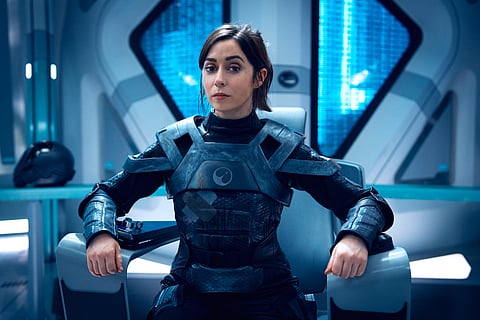Black Mirror Season 7: Has Netflix’s dystopian drama lost its edge?
The shock factor that once defined the series seems to have dulled

Black Mirror has always held a special place in my heart, even before it exploded onto the global stage after its early days on Channel 4 in the UK.
It was bold, gripping, and unflinchingly different - a chilling glimpse into dystopian futures that often felt uncomfortably close to our present reality.
Episodes like “White Bear” from season two, where a woman struggles to dismantle a signal controlling the masses through their screens, or the brilliantly unsettling “Crocodile,” which culminates in a shocking act of violence to protect a buried secret, were not just standout moments - they defined what made Black Mirror exceptional.
The show thrived on subverting expectations, offering jaw-dropping twists when you thought you had it all figured out. It was television at its finest.
Yet, something feels different now. The new series, released last week on Netflix, doesn’t quite hit the same nerve. While I binged all six episodes in one night - and found them entertaining - the shock factor that once defined the series seems to have dulled.
It’s a pattern that began creeping in with season six, which also felt lacklustre compared to the earlier seasons.
Dare I say, the latest episodes feel almost... predictable? After seven seasons, it seems like the creative team might be running out of fresh ways to shock us, challenge our perceptions, or terrify us with the dark possibilities of technology.
That’s not to say Black Mirror has lost all its appeal. It still offers compelling storytelling and intriguing concepts, but the punch that made it unforgettable seems to have softened.
Take season seven’s opening episode, “Common People”. It follows Amanda Waters (Rashida Jones) and her husband, Mike (Chris O’Dowd), as they navigate the controversial process of digitizing and transplanting human consciousness after Amanda is diagnosed with a brain tumour.
While the concept is undeniably interesting, it feels overly familiar - territory the show has already explored in the brilliant “San Junipero”, “Black Museum”, and to some extent, “Be Right Back’. Those earlier episodes handled similar themes of preserving or recreating consciousness with far more nuance and impact.
Rather than retreading these ideas, why not revisit one of those worlds and take us deeper into its untapped potential?
Episode two, “Bête Noire”, ventures into darker territory, leaning slightly into the horror elements that dominated season six. It’s not a bad episode, but it drifts away from the core of Black Mirror: dystopian sci-fi that interrogates our relationship with technology. For me, it lacked the spark that makes the show special.
“Hotel Reverie”, the third episode, shifts to a more whimsical tone, blending a traditional love story with futuristic tech. Brandy, a film star, uses immersive technology to enter the classic romantic film Hotel Reverie and falls in love with its lead, Dorothy Chambers. It’s a clever premise, but the story fizzles when the tech inevitably fails, ending the romance abruptly. While enjoyable, it lacks the inventive punch we’ve come to expect.
Then there’s “Plaything”, which begins with a promising, tension-filled first 30 minutes but unravels into a narrative where... well, nothing much happens. The less said about it, the better.
Meanwhile, “Eulogy” tugs at the heartstrings but ultimately feels too predictable. If you didn’t guess that the AI assistant was Carol’s daughter from the moment it was introduced, you probably haven’t been keeping up with Black Mirror. While predictability can be forgivable when followed by a jaw-dropping twist, here, there’s none - it just coasts to a gentle conclusion.
The season closes with “USS Callister: Into Infinity”, a direct sequel to the standout episode from season four. This is easily the best of the bunch, recapturing the energy and creativity of earlier seasons. It even delivers one final, jaw-dropping twist in its closing moments - a reminder of why we fell in love with Black Mirror in the first place.
Overall, season seven is solid. It’s entertaining, thought-provoking in parts, and still a cut above much of what’s on TV. But it’s not the Black Mirror of old - the one that consistently shocked, unsettled, and left you reeling. Maybe I’m biased by nostalgia, or maybe Black Mirror has simply become too familiar for its own good. Either way, while the series still shines, it no longer blinds.



